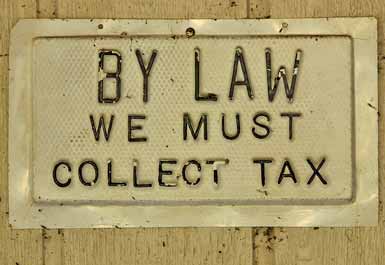The prospect of new fees or taxes on Internet services is not the only digital tax proposal aimed at technology use (previous digital tax policy posts on digital sales tax, Netflix tax, ISP tax). For the past year, the music industry has engaged in a campaign to expand the existing tax on blank CDs to all digital devices, including smart phones. The groups argue that while the government is sorting out the details of its new digital device tax, it should provide a $40 million annual handout to the industry to compensate for consumer copying. It has proposed a four year commitment at a public cost of $160 million.

California Internet tax bill breakdown by Stephanie Robogeisha (CC BY-NC-SA 2.0) https://flic.kr/p/9YoqbP
Digital Tax
Making Sense of the Canadian Digital Tax Debate, Part 3: New Taxes or Fees on Internet Access
A potential Netflix tax may garner the lion share of media attention, but the more harmful tax proposal comes from those advocating for a tax on Internet service providers that would have a real impact on all Internet use (earlier posts in the series include digital sales tax and Netflix tax). As far back as 1998, the CRTC conducted hearings on “new media” in which groups argued that the dial-up Internet was little different than conventional broadcasting and should be regulated and taxed as such. In other words, groups have been arguing for new Internet taxes since before Google, Facebook, or Netflix.
Making Sense of the Canadian Digital Tax Debate, Part 2: Mandated Canadian Content Contributions aka a “Netflix Tax”
The series on the Canadian digital tax debate continues with an examination of calls for mandated contributions by Internet video services to support the creation of Canadian content, frequently referred to as a “Netflix tax” (earlier post on digital sales tax). The Netflix tax is perhaps the most politicized digital tax issue, with both the Conservatives and Liberals opposing such a tax during the last federal election. Despite the opposition, the issue continues to resurface as it is regularly raised by cultural groups and was part of the CRTC’s report on the future of broadcast regulation released in the spring.
Proponents of a mandated Netflix contribution typically rely on three arguments: (i) failure to impose fees and regulation on foreign providers represents an “existential threat” to Canadian creative industries since they argue it will lead to reduced spending on production in Canada; (ii) there is a need to “level playing field” for Canadian services competing against foreign providers; and (iii) Europe is moving toward Netflix regulation and Canada should too.
Making Sense of the Canadian Digital Tax Debate, Part 1: Digital Sales Taxes
Digital tax has emerged as one of the most contentious Canadian digital issues with groups advocating for a wide range of new enforcement or policy measures including digital sales tax, taxes on online video services, income taxes on digital companies, tax measures in support of media organizations, Internet access taxes, and digital device taxes. Unfortunately, the debate is often muddled by the use of the same terms, creating considerable confusion. For example, references to “Netflix taxes” have been used with regard to digital sales tax on Netflix, mandated Canadian content contributions for Internet services such as Netflix, and income taxes payable by Netflix.
This blog series will attempt to unpack digital tax debate. The series begins with digital sales taxes, which was back in the news earlier this month when Finance Minister Bill Morneau confirmed that Canada is awaiting an international agreement on digital sales taxes before implementing any domestic reforms. Morneau indicated the government would support a quick resolution of the issue – the current deadline is 2020 – but that a provincial digital sales tax in Quebec will not spark a matching federal tax until the global issues are resolved.
Quebec Digital Sales Tax Plan Shows It Is Easier Said Than Done
Government officials and cultural groups in Quebec have been banging the drum for much of the past year for the imposition of digital sales taxes on services such as Netflix. The debate is often framed around the notion that Netflix and other Internet companies should be collecting sales tax like any other service provider. Supporters argue that other countries have begun to levy sales taxes on digital services and Canada should do the same.
My Globe and Mail op-ed notes the federal government has sent mixed signals to date, with Prime Minister Justin Trudeau rejecting new taxes on the grounds that Canadians “pay enough for the Internet”, Canadian Heritage Minister Mélanie Joly seemingly keeping the door open to new taxes, and Finance Minister Bill Morneau committing to studying the issue while international standards develop.











